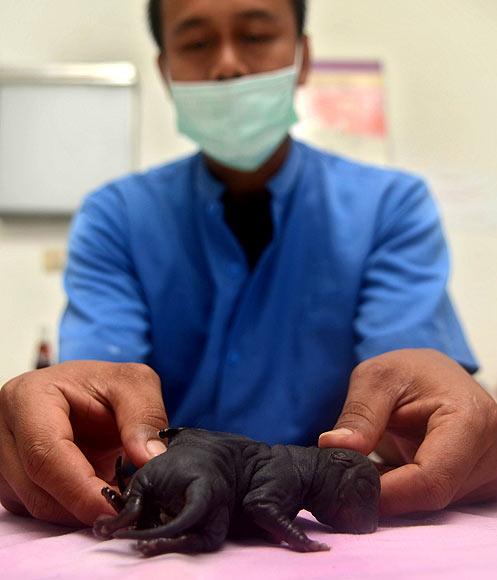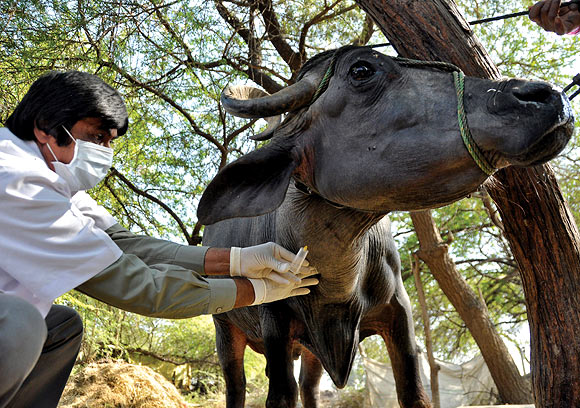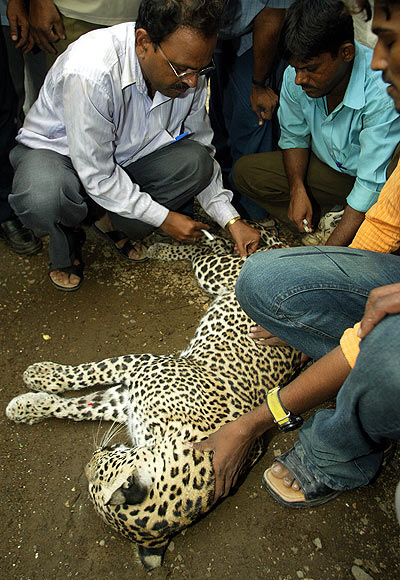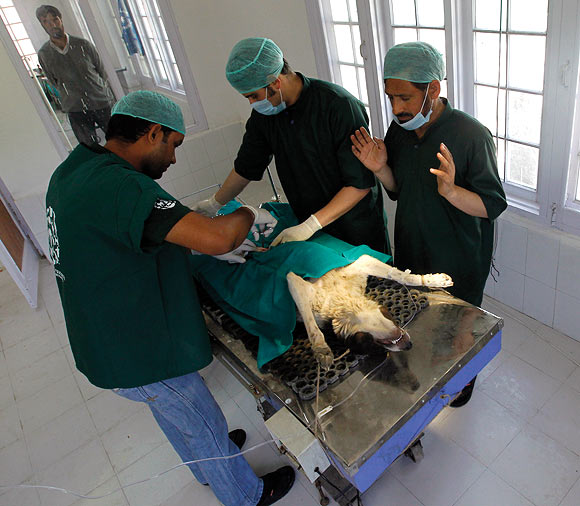Photographs: Nurcholis/Getty Images
A Bachelor of Veterinary Science and Animal Husbandry degree helps to treat animals better. Learn how animals play a vital role in our ecosystem.
FAST FACTS
Programme: Bachelor of Veterinary Science & Animal Husbandry (BVSc & AH)
Best colleges: Bombay Veterinary College, Madras Veterinary College, Chennai; Lala Lajpat Rai University of Veterinary and Animal Sciences, Hisar, College of Veterinary and Animal Sciences, Parbhani
Eligibility: 10 2 in Science with Physics, Chemistry and Biology
Job options: Own clinic, government and private hospitals, NGOs, banks, insurance, BPOs, KPOs, insurance agencies, R&D wings of pharmaceutical & biological industry, national parks, zoos & wildlife sanctuaries
Sanjana Karve spent her childhood playing more with animals than kids of her own age!
She adopted two dogs and feeds, cares and talks to them, too.
Her deep concern for animals prompted her to choose veterinary science course, which trains her to give quality care to animals at all stages of their lives.
“Animals have a mind of its own. I learn how to approach, hold, feed and treat them,” says Sanjana, a third year BVSc & AH student at Bombay Veterinary College.
From treating small animals, she has graduated to treating buffaloes, cows, sheep, goats, pigs and horses.
She shares her first experience of rearing a farm on the college premises.
“I had to restrain the cow through it’s nostrils. I was scandalised initially, but the teacher taught us the skill to hold and treat them efficiently. I am pretty confident today dealing with endangered animals,” says Sanjana Karve.
Please click NEXT to continue reading...
Rising demand for veterinary professionals
Image: Veterinary professionals are in huge demand across domainsPhotographs: Amit Dave / Reuters
With the mushrooming of poultry farms and more people keeping pets, the demand for veterinarians is increasing,” says Dr Sudhir Rajurkar, College of Veterinary Science, Parbhani.
Veterinary services help to treat animals better as they play a vital role in our ecosystem - right from being close companions to contribution in the growth of economy.
The gross national income from animals, by a modest estimate is around Rs 1,83,000 crores per annum.
It would approximately mean Rs 500.21 crores everyday.
In India, 67 per cent of farmers own about 70 per cent of livestock that produce 30 billion eggs and 0.6 million tons poultry meat.
So there’s a huge demand for veterinarians in diverse sectors of livestock and poultry.
They can treat diseases and carry out surgeries.
How you can enter the profession
Image: As part of the curriculum, a veterinary doctor is required to study the anatomy and physiology of different animalsPhotographs: Punit Paranjpe/Reuters
Animal versus human medicine
In both human and veterinary science, the values of medicine studies are similar but what is the difference?
Unlike physicians who just study the human body, vets study anatomy and physiology of different animals.
The diagnosis, treatment and cure of diseases vary from birds to other animals.
So the job profile of a veterinarian is much beyond that of a general human physician.
How to enter veterinary college
You must acquire Bachelor of Veterinary Science and Animal Husbandry (BVSc & AH) degree, to practice as a vet.
A Class 12 student with science subjects can appear for All India Pre-Veterinary Test for admission to veterinary colleges in India.
The five-year course also entails a compulsory six-month internship.
The curriculum is designed in a way that in the first four years, students get theoretical knowledge on basic sciences - anatomy, physiology, biochemistry, nutrition, livestock management and production technology, pathology, microbiology, pharmacology, genetics.
Courses which are related to clinical practices are taught after basics like disease diagnosis, surgery and animal husbandry.
Furthermore, the hands-on internship trainings at hospitals, dairying and poultry farms elevate their confidence.
The annual fee varies from Rs 10,000 to 15,000 yearly across institutes.
Trained professionals can earn Rs 40,000 upwards
Image: Veterinary science professionals must be able to analyse animal behavior through their non-verbal expressions and movementsPhotographs: Fayaz Kabli/Reuters
“If you are dealing with companion animals like dogs and cats, then it is quite a lucrative career. It takes three to four years to market yourself and you can earn around Rs 40,000 or at times 5-7 lakhs per month,” says Dr Vinat S Gorhe who has been operating a private clinic called Pet Cover at Pune for 26 years now.
His clinic offers everything! From pet shop, clinic, grooming parlour, surgery and cattery.
Veterinarians further have the choice to work at private and government veterinary hospitals, farms related to poultry, sheep and rabbit.
“In government sector, they can work as Class-II Livestock Development Officers at municipal corporation dispensaries and banks like National Bank for Agriculture and Rural Development (NABARD) where farmers get proposals to start their poultry farms,” says Dr Gatne.
They can fill the position of public health officers at national parks, zoos and wildlife sanctuaries.
Options are aplenty in other sectors like - corporate farms, food industry, knowledge processing outsourcing, insurance agencies, pharmaceutical and biological industry in both research and development wing.
They can set up hatcheries - feed manufacturing units, wholesale outlet for trading poultry and livestock products.
“A good vet must be courageous enough to perform surgeries anywhere. During worst cases, there may be lack of proper tools or facilities to conduct invasive treatment at village level,” tips off Dr. Rajurkar.
The most important role of vet is to understand animals’ psychology and provide holistic treatment for animals that cannot express their feelings.
Dr Mukulesh L Gatne, Professor at Bombay Veterinary College says, “Animals cannot express their suffering and illness, so as a clinician you must be able to analyse their behaviour well – everything has meaning -- from face, tail, eyes, claws, head to leg movements.





Comment
article